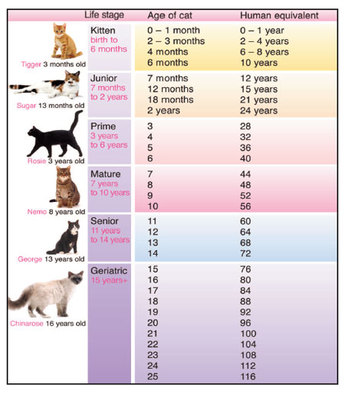
1. Don't Forget the Health Check-ups for Your Cat. Make sure your senior cat has regular visits with your veterinarian. In fact, many veterinarians recommend that senior cats should be examined twice a year, even more so if your cat has serious health issues. A thorough physical examination by your veterinarian may reveal health issues that can impact your cat’s life and comfort level, such as dental disease, arthritis, heart disease, kidney disease and more.
2. Note Any Behavior Changes in Your Cat. Watch your senior cat’s behavior carefully. This is important for all pets but doubly so for senior cats. Changes in your cat’s behavior may be a symptom of disease. Watch specifically for changes in your cat’s appetite and water consumption. Watch for changes in urinary and bowel habits and alterations in sleep routines. If your cat suddenly becomes irritable for no reason, it may be because he is in pain, having difficulty seeing, or having a hard time hearing properly. Any changes in your senior cat’s routines or behaviors should prompt a consultation with your veterinarian.
3. Make it Easier for Your Cat to Get Around. Be aware that your senior cat may have pain caused by arthritis or other health issues that make it difficult for him to get around as well as he did when he was younger. Consider providing ramps or stairs to allow your senior cat access to furniture or beds. Ramps on stairs may make it easier for your pet to get up and down the stairs, and carpeting on slippery floors may help your dog gain his footing. A litter box with lower sides can make it easer for your cat to get in and out of the box, and an extra litter box in another part of the house can help to prevent accidents.
4. Choose an Age-Appropriate Diet for Your Cat. Dietary requirements may change as your cat ages. It's important that you provide your senior cat a pet food that is age appropriate. Some older pets tend to gain weight and may need a diet for less active cats. Others may have difficulty holding their weight and may need a diet with a higher calorie content or better palatability. Older cats also may have diseases that can be manipulated and/or controlled at least partly through diet. Your veterinarian can help you choose an appropriate diet for your senior cat based on cat’s individual nutritional requirements.
5. Pimp Out Your Cat's Bed. Provide soft blankets and towels for your senior cat's bed. This will help him to rest easier and sleep better. There are even special orthopedic beds made for senior cats. In addition to having a denser form to help cushion your senior cat's aging joints, some orthopedic beds can be outfitted with a heat and/or vibration source, which increases circulation and reduces stiffness — perfect for dogs with arthritis.

 RSS Feed
RSS Feed
